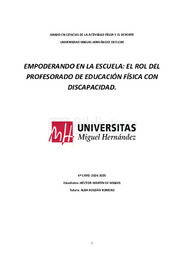Please use this identifier to cite or link to this item:
https://hdl.handle.net/11000/37480Full metadata record
| DC Field | Value | Language |
|---|---|---|
| dc.contributor.advisor | Roldán Romero, Alba | - |
| dc.contributor.author | Martín de Miguel, Héctor | - |
| dc.contributor.other | Departamentos de la UMH::Ciencias del Deporte | es_ES |
| dc.date.accessioned | 2025-09-24T07:16:54Z | - |
| dc.date.available | 2025-09-24T07:16:54Z | - |
| dc.date.created | 2025-05 | - |
| dc.identifier.uri | https://hdl.handle.net/11000/37480 | - |
| dc.description.abstract | La investigación sobre el profesorado de educación física con discapacidad es muy limitada, ya que la mayoría de los estudios se han centrado en adaptar la enseñanza al alumnado con discapacidad, dejando de lado las experiencias y necesidades de los propios docentes con discapacidad. esta falta de representación no solo refleja un déficit en equidad e inclusión, sino que también impide que los estudiantes cuenten con modelos positivos que promuevan valores como la empatía, la resiliencia y la diversidad. Los docentes con discapacidad enfrentan numerosas barreras físicas, estructurales y sociales, que dificultan su ejercicio profesional en igualdad de condiciones. además, la asignatura de educación física plantea desafíos específicos debido a sus demandas físicas, lo que refuerza la necesidad de visibilizar y apoyar a estos profesionales. Objetivo del estudio: identificar las barreras y facilitadores que afronta el profesorado de educación física en activo, especialmente aquellos con discapacidad, para avanzar hacia una educación verdaderamente inclusiva. | es_ES |
| dc.description.abstract | Research on physical education teachers with disabilities is very limited, as most studies have focused on adapting teaching to students with disabilities, overlooking the experiences and needs of the teachers themselves. this lack of representation not only reflects a deficit in equity and inclusion, but also prevents students from having positive role models who promote values such as empathy, resilience, and diversity. Teachers with disabilities face numerous physical, structural, and social barriers that hinder their ability to perform their professional duties on equal terms. moreover, the subject of physical education presents specific challenges due to its physical demands, which further highlights the need to raise awareness and support these professionals. Objective of the study: to identify the barriers and facilitators faced by active physical education teachers, especially those with disabilities, in order to move towards a truly inclusive education. | es_ES |
| dc.format | application/pdf | es_ES |
| dc.format.extent | 9 | es_ES |
| dc.language.iso | spa | es_ES |
| dc.publisher | Universidad Miguel Hernández de Elche | es_ES |
| dc.rights | info:eu-repo/semantics/openAccess | es_ES |
| dc.rights | Attribution-NonCommercial-NoDerivatives 4.0 Internacional | * |
| dc.rights.uri | http://creativecommons.org/licenses/by-nc-nd/4.0/ | * |
| dc.subject | Inclusión | es_ES |
| dc.subject | Barreras | es_ES |
| dc.subject | Diversidad | es_ES |
| dc.subject | Accesibilidad | es_ES |
| dc.subject | Educación | es_ES |
| dc.subject | Adaptación | es_ES |
| dc.subject.other | CDU::7 - Bellas artes::79 - Diversiones. Espectáculos. Cine. Teatro. Danza. Juegos.Deportes | es_ES |
| dc.title | Empoderando en la escuela: el rol del profesorado de educación física con discapacidad. | es_ES |
| dc.type | info:eu-repo/semantics/bachelorThesis | es_ES |

View/Open:
TFG Martín de Miguel, Héctor.pdf
929,51 kB
Adobe PDF
Share:
.png)
